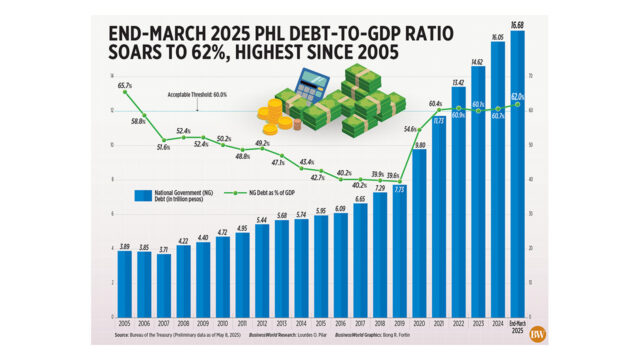By Kenneth Christiane L. Basilio, Chloe Mari A. Hufana and Adrian H. Halili, Reporters
SENATORIAL candidates in this year’s Philippine midterm elections will prioritize small business development, while cushioning local industries from a looming global trade war that puts economic growth, jobs and wages at risk.
They also vowed to push more jobs and measures that would boost food security amid rising global prices.
 “The solution to that is jobs, jobs, jobs,” former Senator and pound-for-pound boxing camp Emmanuel “Manny” D. Pacquiao, who is running for a Senate seat on May 12, told BusinessWorld in Filipino. “I will push for massive investments in public infrastructure especially in rural areas and support programs for micro, small and medium enterprises (MSME).”
“The solution to that is jobs, jobs, jobs,” former Senator and pound-for-pound boxing camp Emmanuel “Manny” D. Pacquiao, who is running for a Senate seat on May 12, told BusinessWorld in Filipino. “I will push for massive investments in public infrastructure especially in rural areas and support programs for micro, small and medium enterprises (MSME).”
“People need livelihoods, not just dole-outs,” he said in a Viber message.
The government of President Ferdinand R. Marcos, Jr. has missed growth targets in the past two years, with economic output expanding by 5.5% in 2023 — below the 6-7% — and 5.6% in 2024, falling short of the 6-6.5% goal.
Mr. Marcos will enter the second half of his term this year, three years after pledging to revive an economy weakened by the COVID-19 pandemic, subdued consumption and lower farm output.
The Philippines is also under pressure to boost intra-regional trade as US President Donald J. Trump’s tariffs increasingly jam the wheels of a global economy that for decades had been oiled by predictable free trade.
BusinessWorld sought the comments of the top 18 senatorial bets in mid-April on key economic issues, but only Mr. Pacquiao, Las Piñas Rep. Camille Villar-Genuino, former Senator Panfilo M. Lacson and Party-list Rep. Erwin T. Tulfo replied.
“One of my top priorities will be to drive inclusive economic growth by empowering MSMEs,” Mr. Lacson said in a Viber message. “They are struggling due to limited access to capital, red tape and rising costs.”
MSMEs account for more than 99% of all businesses in the Philippines, generate 67% of the country’s total employment and contribute about 40% to gross domestic product (GDP), according to the United Nations Development Program.
Mr. Lacson said he would push measures that would simplify business rules, provide tax incentives and ease access to MSME loans.
Meanwhile, Ms. Villar said she would file bills that seek to boost the agriculture, manufacturing and service sectors, while reforms in business regulation and good governance would help attract investments.
“The country needs to focus on three critical areas — enhancing competition and global integration, investing in skills and strengthening institutions,” she added.
Mr. Tulfo said he would propose measures that would expand irrigation systems and support the construction of post-harvest facilities and extend assistance to local producers especially during crises.
“We will push for the effective implementation of the Ease of Doing Business law in the country so more investments will enter the country to generate more jobs for Filipinos,” he added.
NO NEW TAXES
All four candidates were reluctant to raise or introduce new taxes, focusing instead on improving tax collections.
“The government should first address the leakages in tax administration,” said Mr. Lacson, who championed the campaign against pork barrel funds when he was still a senator, before these were voided by the Supreme Court for being illegal. He vowed to strictly oversee the government budget if elected senator.
Finance Secretary Ralph G. Recto last week said the government was not looking to impose new taxes after the state met its revenue goals. The government collected P931.5 billion in revenue in the first three months.
Mr. Tulfo said he plans to oversee the implementation of the Ease of Paying Taxes Law, ensuring it is properly enforced to enhance revenue collection without introducing new taxes.
“I’m for tax implementation and honest tax collection, and going after those who evade taxes,” Ms. Villar said.
“I do not want to add more burden on the poor,” Mr. Pacquiao said. “Before discussing new taxes, we must first eliminate corruption and enhance tax collection efficiency.”
The senatorial candidates also vowed to file measures that would protect local industries and promote industry diversification amid US President Donald J. Trump’s sweeping reciprocal tariffs.
The Philippines should develop its domestic industries to cushion itself from global economic uncertainties, they said.
“We really must strengthen domestic production and commerce by supporting our local producers and MSMEs,” Mr. Tulfo said.
He said he would gather relevant agencies such as the Trade and Agriculture departments to devise a strategy that would cushion exporters from the looming global trade war.
“If we have reliable commerce in the country, we can replicate it by diversifying our exports to other countries,” he added.
Mr. Pacquiao said there’s a need to invest in industries the Philippines is strong at, such as agriculture, digital services and the creative industries.
“I will support trade diversification and push for better trade deals with the Association of Southeast Asian Nations (ASEAN) and Asia-Pacific nations to lessen reliance on US-China markets,” he added.
The government should prioritize the passage of a bill diversifying the country’s trade and investment partners, Mr. Lacson said. “Trades from undertapped regions like Southeast Asia, Africa and Europe should be incentivized through simplified export procedures, reduced tariffs and trade agreements,” he added.
“Before allowing measures that would free up trade restrictions, we should ensure that our own products are globally competitive,” Mr. Lacson said.
Ms. Villar said the Corporate Recovery and Tax Incentives for Enterprises to Maximize Opportunities for Reinvigorating the Economy (CREATE MORE Act) would “strengthen our ability to attract investors looking to expand or relocate to the Philippines, given the relatively lower tariffs imposed on our exports to the United States.”
Mr. Pacquiao and Mr. Lacson also cited the need to promote renewable energy such as solar, wind, and nuclear power.
The boxing champ said the country should seriously consider setting up nuclear power plants to support industry and household power needs.
Fiber optic technology could revolutionize power transmission by ensuring faster, more efficient and stable energy distribution across the region, he added.
“Unlike traditional copper wiring, fiber optics minimizes energy loss, reduces maintenance costs and improves overall power infrastructure resilience,” he said, adding that the country should upgrade its fiber optic networks nationwide to ensure connectivity.
ELECTRICITY PRICES
Mr. Lacson said access of Filipino farmers to alternative energy sources should be improved, while tax incentives should be given to renewable energy generation companies.
“Lawmakers can also use their oversight powers to look into whether existing laws on electric cooperatives are being implemented properly,” he said. “The Senate should move for an audit of all add-on charges on electric bills, such as contract costs, universal charges and system losses.”
Mr. Lacson also proposes to put a cap on system losses, which are passed on to consumers, to lower electricity prices.
“Since consumers bear the brunt, power generation companies tend to become lax in rendering services. Thus, in effect, we consumers are rewarding them for not doing their job,” he added.
Mr. Lacson said changes to the Electric Power Industry Reform Act should include transparency in power supply agreements between distribution and generation companies to prevent pass-on costs detrimental to the public.
Ms. Villar plans to cut the “excessively high 15% weighted average cost of capital,” which she said raises electricity costs.
She also wants to review all “unfair and fraudulent contracts, power shortages and delayed transmission projects that directly affect consumers.”
Meanwhile, Mr. Pacquiao and Mr. Tulfo want to amend the Rice Tariffication law.
“Support local production,” Mr. Pacquiao said. “I will push for the review of the Rice Tariffication law and give more subsidies to our rice farmers.”
Mr. Tulfo said restoring the power of the National Food Authority to buy and sell rice “will pave the way for cheaper options and competition,” as traders and middlemen continue to manipulate farmgate and retail prices.
Ms. Villar, whose mother was the principal of the Rice Tariffication law, said she would push the appointment of an official responsible for keeping rice prices stable.
“I am for the designation of a rice czar who will complement the Agriculture secretary in efforts to maintain the price of rice,” she said. “He will also manage the sustainability of rice in the market.”
“I will file a ‘Farmer First’ law — more budget for irrigation, mechanization and farm-to-market roads,” Mr. Pacquiao said. “We need food terminals and cold storage facilities so that farmers don’t lose money.”
Ms. Villar said that she would support state efforts to modernize agriculture by mechanizing farm processes, improving farm and post-harvest infrastructure, enhancing logistics and adopting science-based strategies.

















